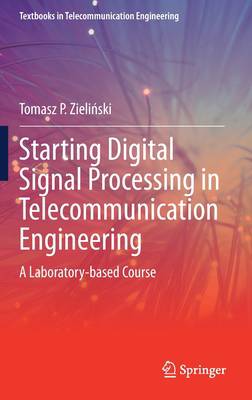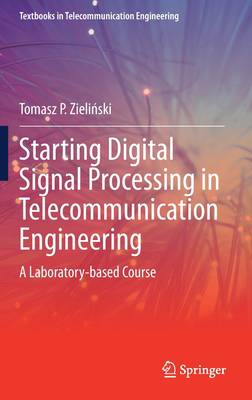
- Afhalen na 1 uur in een winkel met voorraad
- Gratis thuislevering in België vanaf € 30
- Ruim aanbod met 7 miljoen producten
- Afhalen na 1 uur in een winkel met voorraad
- Gratis thuislevering in België vanaf € 30
- Ruim aanbod met 7 miljoen producten
Starting Digital Signal Processing in Telecommunication Engineering
A Laboratory-Based Course
Tomasz P ZielińskiOmschrijving
This hands-on, laboratory driven textbook helps readers understand principles of digital signal processing (DSP) and basics of software-based digital communication, particularly software-defined networks (SDN) and software-defined radio (SDR). In the book only the most important concepts are presented. Each book chapter is an introduction to computer laboratory and is accompanied by complete laboratory exercises and ready-to-go Matlab programs with figures and comments (available at the book webpage and running also in GNU Octave 5.2 with free software packages), showing all or most details of relevant algorithms. Students are tasked to understand programs, modify them, and apply presented concepts to recorded real RF signal or simulated received signals, with modelled transmission condition and hardware imperfections. Teaching is done by showing examples and their modifications to different real-world telecommunication-like applications. The book consists of three parts: introduction to DSP (spectral analysis and digital filtering), introduction to DSP advanced topics (multi-rate, adaptive, model-based and multimedia - speech, audio, video - signal analysis and processing) and introduction to software-defined modern telecommunication systems (SDR technology, analog and digital modulations, single- and multi-carrier systems, channel estimation and correction as well as synchronization issues).
Many real signals are processed in the book, in the first part - mainly speech and audio, while in the second part - mainly RF recordings taken from RTL-SDR USB stick and ADALM-PLUTO module, for example captured IQ data of VOR avionics signal, classical FM radio with RDS, digital DAB/DAB+ radio and 4G-LTE digital telephony. Additionally, modelling and simulation of some transmission scenarios are tested in software in the book, in particular TETRA, ADSL and 5G signals.
- Provides an introduction to digital signal processing and software-based digital communication;
- Presents a transition from digital signal processing to software-defined telecommunication;
- Features a suite of pedagogical materials including a laboratory test-bed and computer exercises/experiments.
Specificaties
Betrokkenen
- Auteur(s):
- Uitgeverij:
Inhoud
- Aantal bladzijden:
- 861
- Taal:
- Engels
- Reeks:
Eigenschappen
- Productcode (EAN):
- 9783030492557
- Verschijningsdatum:
- 30/01/2021
- Uitvoering:
- Hardcover
- Formaat:
- Genaaid
- Afmetingen:
- 216 mm x 284 mm
- Gewicht:
- 2131 g

Alleen bij Standaard Boekhandel
Beoordelingen
We publiceren alleen reviews die voldoen aan de voorwaarden voor reviews. Bekijk onze voorwaarden voor reviews.











